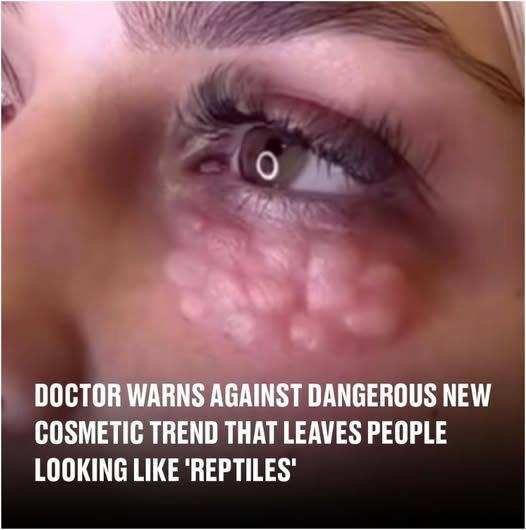A rising cosmetic trend is drawing serious concern from medical professionals, as its popularity spreads across social media platforms like TikTok and Instagram. Known as mesotherapy, this procedure promises smoother skin, fewer wrinkles, and reduced under-eye bags, but doctors are warning that it carries significant risks that many individuals might not fully understand. While it has been a common practice in Europe and other countries for decades, mesotherapy is still relatively new in the United States. As more people jump on the bandwagon in search of a youthful appearance, experts are urging caution and emphasizing the potential dangers associated with this trendy treatment.

So, what exactly is mesotherapy? It’s a non-surgical cosmetic procedure that involves injecting a customized cocktail of vitamins, enzymes, hormones, and other nutrients just below the skin’s surface using extremely fine needles. These injections are designed to target specific areas, helping reduce stubborn fat, tighten loose skin, and minimize the appearance of wrinkles and under-eye bags. Originating in France in 1952, mesotherapy was initially developed to address vascular and immune system issues. Over time, it evolved into a cosmetic treatment marketed for fat loss and skin rejuvenation. Today, it’s most commonly performed on the abdomen, hands, and under-eye area.
On paper, mesotherapy sounds like a quick and easy fix. It’s marketed as minimally invasive, with little to no downtime required after the procedure. However, the reality isn’t always as smooth as the glossy social media posts suggest. Some patients have reported developing unusual skin textures following the injections, with one of the most concerning side effects being skin that appears “reptilian.” Photos and videos showcasing these results have gone viral on social media, sparking heated debates about the safety and ethics of promoting such treatments without clearer regulation and education.
Dr. Viktoryia Kazlouskaya, a board-certified dermatologist based in New York, has been vocal about the dangers associated with mesotherapy, particularly when performed by unqualified technicians or attempted at home. In an interview with MailOnline, she stated, “The risks of under-eye mesotherapy extend beyond minor side effects, particularly when individuals opt for untrained technicians or attempt to perform the procedure themselves at home. Patients may experience prolonged bruising, severe allergic reactions, skin damage from the product entering blood vessels, or even irreversible damage to their eyes.”
One of the biggest concerns surrounding mesotherapy is the lack of standardization in the products used during the procedure. Unlike more regulated cosmetic treatments such as Botox or dermal fillers, mesotherapy allows practitioners to create their own unique blends of fluids, vitamins, and prescription medications. This variability creates a level of uncertainty for patients—they may not fully understand what is being injected into their skin or how their body might react to it. Additionally, some unqualified practitioners may cut corners by using counterfeit or low-quality products, putting patients at even greater risk.
In the United States, mesotherapy remains in a regulatory gray area. While the procedure itself isn’t illegal, it isn’t endorsed by the American Society of Plastic Surgeons, and the Food and Drug Administration (FDA) has not approved any specific medications for mesotherapy use. This lack of oversight leaves patients vulnerable to unregulated treatments and questionable practices. Meanwhile, in the UK, mesotherapy is also largely unregulated, although the government is currently exploring new licensing requirements for non-surgical cosmetic treatments, including mesotherapy.
Beyond allergic reactions and skin irregularities, the risks of mesotherapy can be severe. According to Healthline, potential complications include nerve and blood vessel damage, infections, burns, and irregular skin contours. In the worst cases, if the injected solution enters a blood vessel, it can cause tissue damage, scarring, or permanent disfigurement. These risks are magnified when the procedure is performed by someone who lacks proper medical training or uses unverified substances.
The allure of quick cosmetic fixes is undeniably strong in today’s beauty culture, especially with social media amplifying trends at lightning speed. However, experts emphasize that patients must approach mesotherapy with caution and skepticism. If someone is considering undergoing this treatment, it’s critical to ensure the procedure is performed by a licensed, highly trained medical professional who uses transparent and verifiable products.
Moreover, potential patients should conduct thorough research and ask plenty of questions before proceeding with mesotherapy. What exactly is being injected? Is the practitioner certified? Are the products FDA-approved? These are all crucial details that could make the difference between a successful cosmetic enhancement and a life-changing medical complication.
In an era where beauty trends are often dictated by influencers and viral videos, it’s easy to overlook the potential consequences of poorly regulated treatments. While mesotherapy may seem like a harmless shortcut to younger-looking skin, the risks cannot—and should not—be ignored. Doctors like Dr. Kazlouskaya are sounding the alarm for good reason. Until stricter regulations are in place and more consistent safety protocols are established, anyone considering mesotherapy should tread carefully. In the pursuit of beauty, no quick fix is worth compromising your health and well-being.





